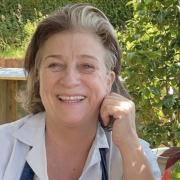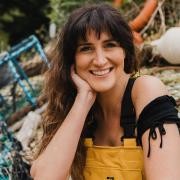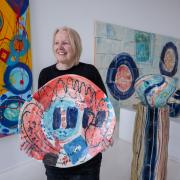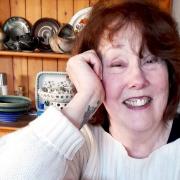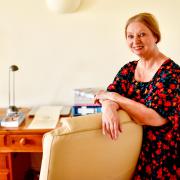Former Spotlight TV presenter Teresa Driscoll tells how losing her mother as a teenager led to the publication of her first novel – Recipes for Melissa

It still feels surreal to see my name on the cover of a novel. People have been asking how I came to write Melissa’s story, so here’s the truth - that, hand on heart, I worried for quite a long time if I should.
I’ve wanted to be a novelist since I was a child. Journalism was a very happy sidestep – first newspapers, then Thames TV as a reporter and finally the BBC in Devon. Telly was wonderful and Spotlight was like a second family. But writing was my first love and the longing to write a novel never left me.
I’m a writer who believes when they say “write about what you know”, they actually mean “write about what you understand” and unfortunately I understand about loss. I lost my mother to cancer when I was 17 and all my life as a journalist I have felt huge compassion for and empathy with people whose stories I have covered… involving loss.
But it’s a tough subject – right? Maybe not one for my fiction? Maybe too personal, even as a theme in my case? I certainly wouldn’t trespass on my family’s privacy; I wouldn’t use any of the facts of my life.

I wrote instead about lots of other things successfully for a long time – as a journalist initially. And later, when I left Spotlight in 2005 I ventured out as a columnist, writing for Devon Life and Cornwall Life as well as selling lots of short stories to leading national magazines.
Quietly alongside this I was still trying to realise that childhood dream to become a novelist. I wrote four unpublished novels – getting near misses with major publishers and lots of rejection letters which tantalisingly said “Teresa writes so beautifully” and “Teresa will definitely make it as a novelist”.
A saner person might have thrown in the towel. But I just couldn’t give it up.
And then when looking for an idea for my fifth book, I started to reconsider using my own emotional landscape as a theme.
I remembered that while working on Spotlight I was asked to start a Race for Life in Plymouth to raise money for Cancer Research and there were all these women with a single word pinned to their back: “Mum”. It upset me deeply and yet it comforted me at the same time. All of us in the same boat on this same rocky sea. And in remembering that moment, I began to think that maybe, as a writer, I had something to say after all.
But a theme is one thing. What about the story? Where on earth would I get a fictional story strong enough to carry this subject that I and so many other people felt so deeply about?
And then two things came together to gift me the idea for Recipes for Melissa. First I had a dream about my mother. I hadn’t seen her for decades – but suddenly there she was, all smiles, at the reception desk of a sports centre while I was watching my son take a swimming lesson through the viewing window. It was a very vivid dream. It was honestly as if I had seen her that morning. “We’re over here,” I said – waving her to my seat. Completely calm.
We sat and nattered about my two boys (my great sadness that, of course, in real life they’ve never met). She gave me lots of tips and advice. She laughed with me about the ups and downs of motherhood… and then suddenly she just drifted off.
When I woke up after that dream, I was overwhelmed. So grateful for the sense of being near her again. For I suddenly realised what exactly it was I missed about going through my adult life without a mother…. and that was never knowing her as a woman myself. Talking - woman to woman. Learning from her about being a mother.
Later, I was in my kitchen skimming through recipe books. I took down a lovely memento book made by a nanny who looked after my elder son when he was tiny while I was working in television.
It was a book of photos of him cooking – alongside sweet recipes we liked to make with him. And suddenly that author thing happened – PING! What if… I started to think. What if; what if…
What if there were a mother who has to leave her daughter and wants to find a way to talk to that daughter “woman to woman” across time? Yes, Teresa. What if there were a mother and daughter sadly separated who could be reconnected… woman to woman? What if the mother used a journal to do that? To say a belated goodbye. A journal of recipes handed down through the family plus letters, photographs, advice… and secrets too.
It was Stephen King who advised that when you suddenly get an idea you feel passionately about, you should write the novel very quickly.
I did! I wrote in a complete fury in a way I have never written before. The house was a tip. The family had no clean clothes. Suddenly it was pizza not home-made lasagne for supper.
But once Melissa and her mother Eleanor stepping into my writing room, it was as if this was the novel I was always meant to write.
Recipes for Melissa is about love and loss…but most important it is, I hope, an ultimately uplifting story about recovery. About learning that when you lose someone you love with all your heart, you eventually realise it is the very love you miss… that will heal you.
I submitted the novel to literary agents last summer. Everything went mad! I ended up choosing between five offers.
My new agent then took the novel to the Frankfurt book fair where it was auctioned between seven German publishers. So far it has sold in five languages.
As I said at the start – it still feels so surreal, I keep having to pinch myself.
Recipes For Melissa is published in the UK by Bookouture as an e-book and paperback via Amazon.
Teresa’s tips for budding writers
Write for the love of it and keep going. Rejection is not a full stop, it is inevitable. I wrote my first novel instead of watching TV for a year. It is still gathering dust. But I’m very fond of it. And – I learned a lot.
Don’t be one of those people who talks more about writing… than actually doing it. Remember the quote: “First drafts don’t have to be perfect, they just have to be written”.
Learn to plan a bit, even if (like me) your instinct is to launch off and follow your characters. I have come to see the real benefits of a good outline. Try it.
Think long and hard about who is telling your story. Viewpoint is critical. And you need to know your characters inside and out.
When you start something new, don’t tell people about it too soon. Even a raised eyebrow may throw you off. Don’t let it happen.
Make sure you can pitch your book in a sentence. Drill down to what it is really about.
Keep going.
Keep going
(did I say that already?)




